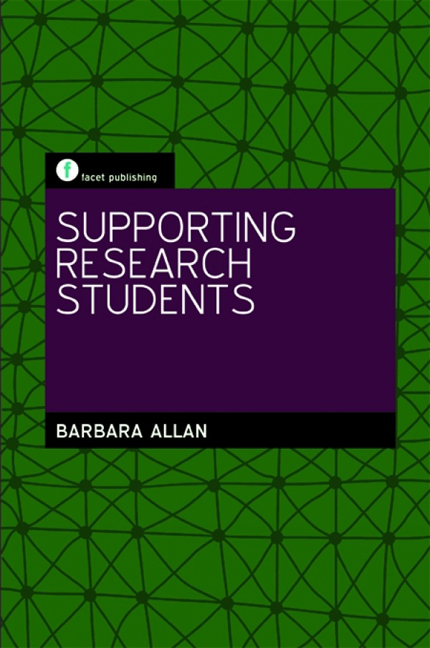Book contents
- Frontmatter
- Contents
- List of figures
- List of tables
- Acknowledgements
- 1 Introduction
- 2 Research and the research process
- 3 The research student's experience
- 4 Moving forward and completing the research
- 5 Research skills training
- 6 Supporting research students in academic libraries and information services
- 7 Virtual graduate schools
- 8 Introduction to research communities
- 9 Professional development
- Conclusion
- References and bibliography
- Index
2 - Research and the research process
Published online by Cambridge University Press: 09 June 2018
- Frontmatter
- Contents
- List of figures
- List of tables
- Acknowledgements
- 1 Introduction
- 2 Research and the research process
- 3 The research student's experience
- 4 Moving forward and completing the research
- 5 Research skills training
- 6 Supporting research students in academic libraries and information services
- 7 Virtual graduate schools
- 8 Introduction to research communities
- 9 Professional development
- Conclusion
- References and bibliography
- Index
Summary
Introduction
In this chapter, I provide an introduction to research and the research process. The aim is to provide library and information workers with a general understanding of research and the language of research. The chapter considers different styles of research, from positivist to interpretivist, and I consider different research methods.
The subject of research and the research process is vast, and academic libraries provide access to hundreds of textbooks on the subject. This makes providing an overview in a single chapter quite a challenge. Consequently, I have selected key ideas and themes and have attempted to indicate the overall shape of the research process and key terms related to it, rather than an exhaustive exposition of the subject. This account is thus very much a generalization and over-simplification. Each topic considered is in itself the focus of a number of textbooks and many research articles. If you require further information or want to explore the debates relating to individual research approaches and methods, then my advice is that you follow up the topic in the context of the discipline(s) that you support within your normal work roles.
Research proposal
The starting point for many research projects is a proposal, which a researcher may write either as a means of gaining funding from an external organization or as a means of gaining resources and permission to proceed from their own organization. A proposal is a written document that outlines what the researcher(s) intend to do in their project. Typically, proposals will be between 1000 and 2000 words long, although proposals in the form of funding bids may be even longer. Many organizations provide a template for producing the proposal or bid, and typical headings for its organization are likely to include:
■ Title
■ Introduction containing:
—project aims and objectives, or research aims and hypotheses/questions
—problem or issue to be addressed
—context of the work, e.g. specific company or sector
—scope of the work, e.g. what will be included and what will be excluded
—unique features of the proposed research, e.g. innovation.
- Type
- Chapter
- Information
- Supporting Research Students , pp. 17 - 40Publisher: FacetPrint publication year: 2009



